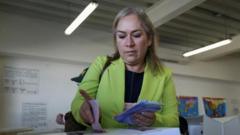Silvia Delgado, a former lawyer for Joaquín "El Chapo" Guzmán, has won election as a local criminal judge in Ciudad Juárez, Mexico, despite controversy regarding her connections to organized crime. The first judicial elections in Mexico's history saw record low voter turnout as Delgado defended her legal work amid accusations.
Controversial Lawyer Who Defended El Chapo Elected Judge in Mexico's Historic Election

Controversial Lawyer Who Defended El Chapo Elected Judge in Mexico's Historic Election
Silvia Delgado has been elected as a criminal judge in Ciudad Juárez, raising eyebrows due to her past defense of notorious drug lord Joaquín "El Chapo" Guzmán.
A former defense attorney for the infamous drug lord Joaquín "El Chapo" Guzmán has been elected to the position of local criminal judge in Ciudad Juárez, marking a significant milestone in Mexico's first-ever judicial elections. Silvia Delgado garnered enough support from voters, despite her controversial past. Critics have accused her of having ties to organized crime due to her role in defending Guzmán, who was extradited to the U.S. in 2017 and convicted of drug trafficking in 2019, currently serving a life sentence in Colorado.
Delgado, aged 51, was part of the legal team representing Guzmán before his extradition and has staunchly defended her actions as fulfilling a legal obligation. In an interview prior to the election, she asserted the importance of legal representation for all individuals, regardless of their charges, and dismissed concerns regarding potential conflicts of interest associated with her candidacy for judicial office.
After the announcement of her election results on Tuesday, Delgado opted not to comment until the victory was officially confirmed. The judicial elections were the first conducted as part of a significant reform introduced by the ruling Morena party, aimed at increasing democracy within the judiciary. Supporters of the reform argue that directly electing judges, including those on the Supreme Court, will improve accountability to the public.
However, critics have raised alarms, claiming this process may threaten the autonomy of the judicial system. Voter participation was notably low, with only 13% turnout, marking it as the least favorable engagement in any federal election in Mexico's history. Observers have suggested that this lack of enthusiasm indicates a broader disinterest among the population regarding the direct election of judges. Despite these concerns, President Claudia Sheinbaum hailed the election as a landmark achievement.






















